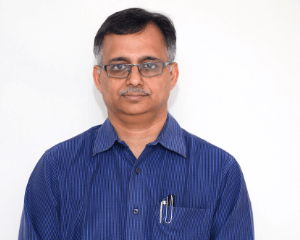

Senior Consultant Neurologist, Trustwell Hospitals Bangalore
Profile of Dr. Vikram Kamath
- About
- Qualification
- Recognition
- Publication
After completing his medical graduation from the prestigious Kasturba Medical College (KMC), Mangalore, Karnataka (Mangalore University) with honors in Pathology and Ophthalmology, he successfully completed his D.M. Neurology, from the National Institute of Mental Health and Neurosciences (NIMHANS) (Deemed University), Bangalore. He started with Rotatory Internship for one year (April 1994- March 1995) at KMC, Mangalore to Senior Consultant Neurologist till date. He deals with Neuropsychology, pediatric neurology, Alzheimer disorder, rehabilitation services, etc. His compassionate and caring approach helps patient heal in confidence.
Dr. Vikram Kamath is one of the best neurologists in Bangalore. He deals with conditions that relate to the brain, strokes, parkinsons Disease and Dementias (Alzheimer's disease).
Previous work experience-
- Rotatory Internship for one year (April 1994- March 1995) at KMC, Mangalore.
- Junior Resident in Neurology at NIMHANS, Bangalore from September 1995 to February 1997 and in Medicine at Victoria Hospital, Bangalore Medical College (BMC), Bangalore from March 1997 to August 1998.
- Senior Resident in the Dept. of Neurology (NIMHANS) from September 1998 to August 2002.
- Assistant Professor in Neurology, St. John’s Medical College Hospital (SJMCH), Bangalore from October 2001 till September 2004.
- Associate Professor at SJMCH from October 2004 to December 2007.
- Senior Consultant Neurologist, Apollo Hospitals Bangalore from January 2008 till date.
- MBBS- Kasturba Medical College (KMC), Mangalore
- D.M. Neurology, from the National Institute of Mental Health and Neurosciences (NIMHANS)
- Rotatory Internship at KMC
- Life member of Indian Academy of Neurology (IAN), Neurological Society of India (NSI) and Bangalore Neurological Society (BNS).
- Autonomic dysfunction in Wilson’s disease-a clinical and electrophysiological study. S Meenakshi-Sundaram, A.B.Taly, V.Kamath, G.R.Arunodaya, S.Rao and H.S.Swamy. Clinical Autonomic Research (2002) 12:185-189.
- Phenobarbitone induced gingival hyperplasia-case report. S.Sinha, V.Kamath, A.B.Taly, G.R.Arunodaya. J Neurol Neurosurg Psychiatry (2002) 73: 601-602.
- Functional MR imaging of hand motor cortex in a case of persistent mirror movement. P.N.Jayakumar, J.M.E.Kavoor, S.G.Srikanth, A.B.Taly, V.Kamath. Neurology India (2003) 51: 94-97.
- Acute Painful Peripheral Neuropathy due to Metronidazole. G R K Sarma, V. Kamath Neurology India (June 2005) Vol. 53: pp. 372-373 Remitting-relapsing Subacute Sclerosing Panencephalitis (SSPE). Case description and mini-review. V Kamath, A B Taly, S Sinha et al. Ann Ind Acad Neurology (2005) 8:101-104
- A case of Parkinsonism worsened by losartan: a probable new adverse effect.
Authors: G R K Sarma, Vikram Kamath, Thomas Mathew, A K Roy. Movement disorders (June 2008) 23(7):1055.
- Subdural hematoma, subarachnoid hemorrhage and intracerebral parenchymal hemorrhage secondary to Cerebral Sinovenous Thrombosis: A rare combination. Thomas Mathew, G.R.K Sarma, Vikram Kamath, A.K. Roy. Neurology India (Jan 2007) 55(4):438-9.
Specialization and Expertise
A stroke is one of the most common neurological emergencies. Stroke occurs when a blood vessel in the brain either gets blocked or ruptures and causes neurological dysfunction including loss of consciousness and paralysis.
Dementia is a term used to describe a set of symptoms indicating loss of intellectual ability including memory, that interfere with daily life. Alzheimer is one of the common types of dementias.
Epilepsy is characterized by unprovoked seizures or fits caused by sudden and unregulated electrical activity in the brain. Epilepsy is treatable provided the patient complies with medication and lifestyle changes as required. Surgery may also sometimes be required in a few of the resistant cases.
Migraine is characterized by its recurrent and episodic headache usually on one side of the head. It can be triggered by certain factors like lack of sleep, skipping a meal or stress. It can be easily controlled with medications and lifestyle modification.
Parkinsons disease is a disorder characterized by slowness of movement, tremors and rigidity of the limbs. It is generally well controlled by properly tailored medication regimen. Functional Surgery (Deep Brain Stimulation- DBS) also forms a method of treating this debilitating disease.
What Our Patient's Say About Us
Team of Cardiology Specialists





Senior Consultant-Gastroenterologist
Department of Gastroenterology
OPD Timings: Mon-Sat (11am-5pm)





Senior Consultant-Gastroenterologist
Department of Gastroenterology
OPD Timings: Mon-Sat (11am-5pm)





Senior Consultant-Gastroenterologist
Department of Gastroenterology
OPD Timings: Mon-Sat (11am-5pm)





Senior Consultant-Gastroenterologist
Department of Gastroenterology
OPD Timings: Mon-Sat (11am-5pm)
What Our Patient's Say About Us - Best Neurologist in Bangalore
Blogs
Healthcare blogs by Trustwell Hospital Consultants to educate the patients on all aspects of lifestyle and other common diseases
Understanding Liver Transplantation: Who Needs It and Why?
Understanding Liver Transplantation: Who Needs It and Why? Read More »
Managing Kidney Transplant Medications: Tips for Success
Managing Kidney Transplant Medications: Tips for Success Read More »
Perforated Eardrum
Bladder Health Awareness
Digestive Disorders: Symptoms, Causes & Treatment Options
Digestive Disorders: Symptoms, Causes & Treatment Options Read More »





